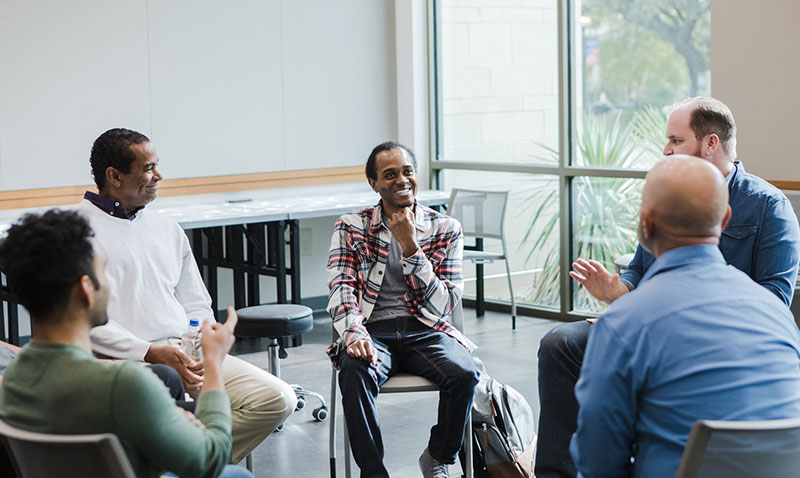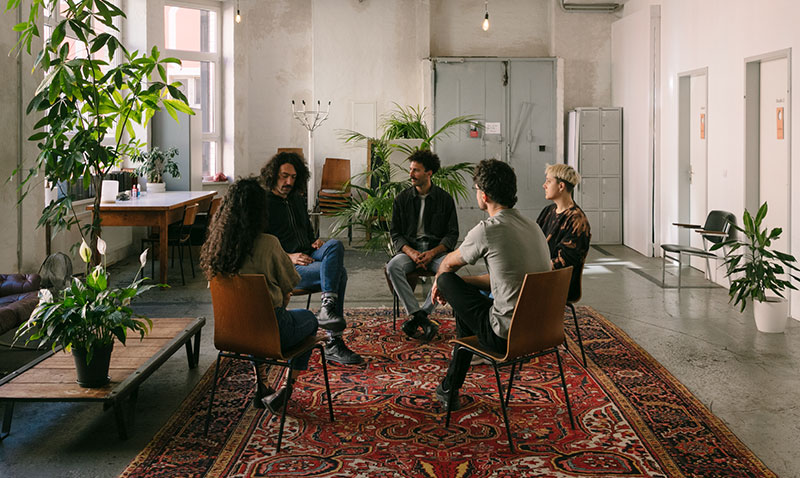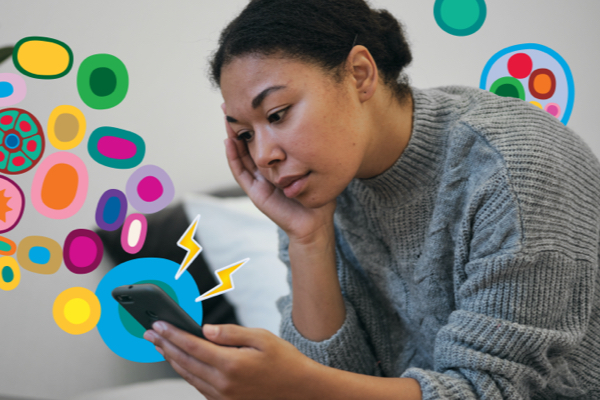Written by Kim Thomson
August 2023
While many may feel hesitant about sharing their experiences in a group setting, peer support programs can provide much-needed help for those who have gone through – or are going through – a tough situation.
We spoke to a peer support practitioner about how these programs work and what to expect.

What is peer support?
While group therapy is facilitated by a professional therapist, peer support programs are run by people with lived experience of the issue at hand.
Bianca Childs, lived experience workforce manager and coordinator of centre of excellence in peer support at Mind Australia, oversees a workforce of 150 peer support workers.
“Peer support is a group of people coming together who have a similar lived experience,” she says.
“At Mind, that’s a lived experience of mental health and recovery; in chronic health, it could be a diagnosis of Multiple Sclerosis; it could be people who have been involved in a traffic accident and been physically impacted; it could be a group of bereaved people.”
Peer support workers at Mind provide direct, one-to-one peer support as well as run groups.
Childs says there’s been a recent growth in lived experience and peer support roles across Australia.
“That’s happening outside of mental health as well; for example, in the police force, for first responders, in corporate areas, and in education,” she says.

Like what you're reading?
The latest edition of Live Better magazine explores the rules and perceptions that are holding us back: from sport, to heart health and the rise of the sober curious movement.
What to expect in a peer support group
Childs says a key benefit of peer support is a sense of “mutuality”.
“There’s no hierarchy … as opposed to a power dynamic between a psychiatrist and a patient — where one person is deemed the expert, and one person is deemed the person receiving the support,” she says.
“Often there’s no leader, there might just be a person who’s bringing people together, who is part of that group as well.”
Childs says groups are structured in a variety of ways — and it’s often up to the group to develop ground rules.
“Most of the time groups set up some kind of group agreement or discomfort agreement around what is acceptable within the group and what is safe and what we don't want in the group — and it’s best when the group leads that.”
If you feel hesitant to open up in front of a group, you might not have to.
“You might not have to share — you might go to a couple of the sessions or a couple of groups and just listen for a while,” says Childs.
Some people attend a group just a few times; others end up going for years.
Crucially, Childs says, peer support is a 2-way exchange of learning, which is beneficial for both parties.
“As a person with lived experience, I receive benefit from connecting with other people with lived experience, and learn from them,” she says.
“By providing peer support, you role model things like appropriate disclosure, as well as role model that hope is possible.”
Is peer support right for you?
Childs adds that, if you feel daunted about attending, speak to the group organisers first.
“Contacting the group and talking beforehand can help you get an idea of what the group is like because there are lots of different ways groups are set up.
“Talking to somebody beforehand, who is either a member of the group or a facilitator, can help have some of your questions answered.”
24/7 Medibank Mental Health Support
Medibank health insurance members can chat to a mental health professional about how they feel and ask questions about a range of mental health concerns for themselves or a loved one and get guidance on what they can do next. Chat online or call 1800 644 325 anytime of the day or night, 7 days a week at no extra cost.~

Related articles
Looking for something else?
Visit our Better Minds hub to find more tools and services.
Things you need to know
~ Some referred services may involve out of pocket costs and waiting periods may apply.
€ Not available for members with extras only cover, ambulance only cover, Overseas Student Health Cover or Overseas Workers or Visitors Health Cover.
While we hope you find this information helpful, please note that it is general in nature. It is not health advice, and is not tailored to meet your individual health needs. You should always consult a trusted health professional before making decisions about your health care. While we have prepared the information carefully, we can’t guarantee that it is accurate, complete or up-to-date. And while we may mention goods or services provided by others, we aren’t specifically endorsing them and can’t accept responsibility for them. For these reasons we are unable to accept responsibility for any loss that may be sustained from acting on this information (subject to applicable consumer guarantees).



